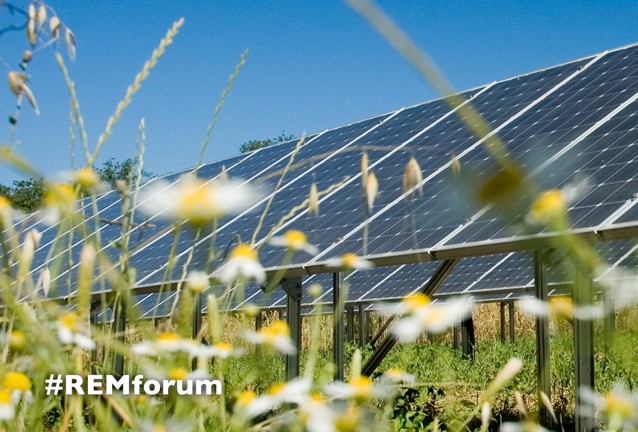Review of 2022
PROGRAMME
"MANAGING THE DYNAMICS OF SOCIAL ACCEPTANCE"
THURSDAY, JUNE 23, 2022 - 18:30
#REMforum WELCOME RECEPTION and PRE-CONFERENCE NETWORKING DINNER
DINNER SPEECH
DYNAMICS OF SOCIAL ACCEPTANCE IN THE FINANCIAL COMMUNITY – HOW ARE INVESTORS EMBRACING THE 1.5°C REALITY, AND WHAT ARE THE IMPLICATIONS FOR A SUCCESSFUL ENERGY TRANSITION?
- Prof. Charles Donovan, Visiting Professor of Finance, University of Washington's Foster School of Business, US
Moderator: Prof. Dr. James W. Davis, School of Economic and Political Science, University of St.Gallen
FRIDAY, JUNE 24, 2022
Moderator: Arthur Honegger (SRF)
09:00 INTRODUCTION TO #REMFORUM 2022
Prof. Dr. Rolf Wüstenhagen Chair for Management of Renewable Energies, University of St.Gallen
09:30 KEYNOTE
DYNAMICS OF SOCIAL ACCEPTANCE - INSIGHTS FROM THE HORIZON 2020 RESEARCH PROJECT MISTRAL
Prof. Dr. Geraint Ellis School of Natural and Built Environment, Queen's University Belfast, UK
10:00 PANEL DISCUSSION I.
WHEN AND HOW DOES FINANCIAL PARTICIPATION INCREASE COMMUNITY ACCEPTANCE OF RENEWABLE ENERGY PROJECTS?
- Dr. Frank Dumeier CEO, WEB Windenergie AG, AT
- Ben Hoen research scientist, Electricity Markets & Policy, Lawrence National Lab Berkeley Lab, US
- Thomas Tribelhorn CEO, ADEV Energiegenossenschaft, CH
- Céline Pfister master student, MaCS certificate, University of St.Gallen, CH
11:00 Coffee Break
11:30 PANEL DISCUSSION II.
HOW DO EMOTIONS AFFECT THE DYNAMICS OF SOCIAL ACCEPTANCE, AND WHAT CAN BE DONE ABOUT IT?
- Prof. Jeremy M. Firestone PhD, Earth, Ocean & Environment, University of Delaware, US
- Hanne May Head of Communications, Deutsche Energie-Agentur (dena), DE
- Prof. Dr. Gabriele Spilker, Excellence Cluster "The Politics of Inequality", University of Konstanz, DE
12.30 LUNCH and Poster Session (MISTRAL ESR et.al.)
13.45 - 15.45 PARALLEL WORKSHOPS A - D
WORKSHOP A: FINANCING HEAT AS A SERVICE
- Elizabeth Côté University of St.Gallen (workshop leader)
- Samuel Haines Product Specialist for Subscription, Otovo AS, NO
- Vincent Rittener Business Line Manager, Romande Energie, CH
- Guro Solem CEO, Winns AS, NO
Heat pumps (HP) are promising heating solutions to decarbonize buildings. However, financial barriers such as high upfront investments often hinder deployment. Heat pump leasing could contribute to overcome barriers to adoption by removing the need for initial investments, reducing complexity of projects, and mitigating risks for end-users. What are the preferences of houseowners and businesses for clean heat as a service? How can we facilitate the financing of such assets? This workshop addresses these questions by bringing together energy service providers to discuss the opportunities and challenges associated with service-base business models in Europe.
WORKSHOP B: ELECTRIFYING AGRICULTURE
- Sabrina Mili University of St.Gallen (workshop leader)
- Sepp Knüsel CEO, Rigitrac, CH (in German)
- David Schuppisser CCO, Insolight, CH
The use of renewable energy and e-mobility has reached the agricultural sector. Installing PV systems on agricultural land (Agro-PV) is becoming increasingly popular in Europe. It not only allows to increase the share of green electricity on the farm, but Agro-PV also offers several benefits to crop production. At the same time, various manufacturers are introducing electrified agricultural vehicles such as e-tractors. Combining both technologies contributes to reaching climate neutrality in the agricultural sector. This workshop introduces the technological development and applications of Agro-PV as well as new trends in electrified agricultural transportation.
WORKSHOP C: B2B ENERGY COMMUNITIES / IN COLLABORATION WITH E-LAND AND ACCEPT
- Dr. Beatrice Petrovich E-LAND project, University of St.Gallen (workshop leader)
- Dr. Daniele Farrace Chief Innovation Officer, Azienda Elettrica di Massagno (AEM), CH
- Minna Kuivalainen E-LAND project, Smart Innovation Norway, FI
Distributed renewable energy sources and smart grids generate power close to where it is consumed. Using these technologies, industrial and commercial districts can become local energy systems or “B2B energy communities”, which are cornerstones for a just and inclusive energy transition. However, their successful and long-lasting implementation requires engagement and acceptance from different local stakeholders and community members. Participants of this workshop will learn how to design non-residential energy communities that meet local stakeholders’ views, values and preferences. It includes inputs from academics and practitioners presenting two case studies. Participants will apply their new knowledge directly by engaging in interactive case study work on designing energy communities.
E-LAND: https://elandh2020.eu/ - ACCEPT: https://www.accept-project.eu/
WORKSHOP D: SMART SOLAR MOBILITY
- Stefan Gahrens University of St.Gallen (workshop leader)
- Dr. Stephan Koch Cofounder, CTO, Adaptricity, CH
- Deborah Learoyd, Managing Director, Freesuns SA, CH
- Florian Wissmann Product Manager, Sun@Home, Repower, CH
Solar Mobility – to harness the power of the sun for e-mobility – is a key solution to achieve Swiss climate goals in the two most crucial sectors –energy and transport. But how can smart charging match the flexible energy demand from electric cars with intermittent solar generation, even after a nuclear phaseout? How can Artificial Intelligence balance the grid to cope with temporary supply inflexibilities and a local grid congestions? Will consumer accept charging when the sun shines? How much charging infrastructure will ensure sufficient flexibility? And what are business models to scale up smart mobility?
15:45 Coffee break
16:00 PANEL DISCUSSION III.
HARD PATHS VS. SOFT PATHS REVISITED - WHAT DOES IT TAKE FOR RENEWABLES TO BE ACCEPTED AS THE SOLUTION TO ENERGY SECURITY?
Moderator: Arthur Honegger (SRF)
- Natalie Sleeman First Counsellor, Head of Sector Trade and Economic Affairs, Delegation of the European Union to Switzerland and the Principality of Liechtenstein, CH
- Marina Weisband psychologist & participation educator, DE
- Prof. Charlie Wilson, PhD, Energy and Climate Change, Environmental Change Institute, School of Geography and the Environment, and Jackson Senior Research Fellow at Oriel College, Oxford, UK
16:45 CONCLUSIONS
- Prof. Dr. Rolf Wüstenhagen Chair for Management of Renewable Energies, University of St.Gallen
About 2022
The war in Ukraine has led to renewed awareness of Europe’s unsustainable dependence on energy imports. In combination with the urgency of climate change, the twofold crisis requires an acceleration of the energy transition. This puts the spotlight on social acceptance: renewable infrastructure projects, as well as ambitious energy and climate policies, are often met with local resistance.
Managing the Dynamics of Social Acceptance was the focus topic of this year’s #REMforum. Speakers and attendees sharef best practices and reflected on current challenges.
Please subscribe to our newsletter HERE and do not miss on anything.
It was great seeing you in St.Gallen in June 2022.
Prof. Dr. Rolf Wüstenhagen & Team

